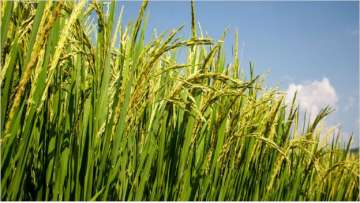Government not to change farmers' share of premium under PMFBY
The government is not going to change farmers' share of premium on crops insured under the Pradhan Mantri Fasal Bhima Yojana (PMFBY), a senior agriculture ministry official said on Friday.

The government is not going to change farmers' share of premium on crops insured under the Pradhan Mantri Fasal Bhima Yojana (PMFBY), a senior agriculture ministry official said on Friday. The PMFBY, which was launched in February 2016 by Prime Minister Narendra Modi, provides comprehensive crop insurance from pre-sowing to post-harvest period against non-preventable natural risks at extremely low premium rate of 2 percent for Kharif crops, 1.5 percent for rabi crops and 5 percent for horticulture and commercial crops.
"It is not correct farmers' premium has been changed. Farmers premium under the PMFBY is not going to change under any circumstances," PMFBY CEO and Joint Secretary in the Agriculture Ministry Ashish K Bhutani said at an agri-summit organized by BusinessLine newspaper here. Bhutani clarified that neither farmers' premium has been changed nor it will be withdrawn in future.
However, the central subsidy under the scheme has been capped recently for premium rates up to 30 per cent for un-irrigated areas/crops and 25 per cent for irrigated areas/crops. Districts having 50 per cent or more irrigated area will be considered as irrigated area/district. If total premium is above 30 per cent, then states have to decide whether to list such crops for insurance or else they have to pay the additional premium, he said.
"If total premium rate is more than 30 per cent, then it is not insurance. Such high rate could be due to reasons like inconsistency of data, lack of availability of structured data for 10 years and crop is not viable in that area," he added. On criticism of delay in claim payout to farmers, the officials said it is primarily due to three reasons.
"Either the state subsidy has not come on time which is the biggest reason for the delayed payment. Second is the delay in giving the Crop Cutting Experiment (CCE) data to the insurance companies and third is the dispute raised by companies on the CCE data collected by states," he said.
To address this problem, Bhutani said some changes have been made in the scheme.
States will not be allowed to implement the scheme in subsequent seasons in case of considerable delay in the release of requisite premium subsidy to insurance companies beyond a prescribed time limit. Cut-off dates for invoking this provision for Kharif and Rabi seasons will be 31st March and 30th September of successive years, respectively, he said.
Refuting reports that insurance companies are making money from the scheme, the official said: "It is not correct." The loss of yield is reported by the state government through CCE and insurance companies make the claim payout based on the that state data. There is no question of tampering of the data, he said.
"In a motor insurance, there is a third party valuer, here the entire exercise of the claim competition is with the state government. The companies have power to co-observe the experiments carried out by the state government," he said. If CCEs data is not given on time, then the technology will be used for collecting the data for timely payment of claims, he added.
Stating that the PMFBY scheme is currently riding on a primitive technology called CCE which is prone to manipulation, the official said there is a need to move to technology-based assessment. The government has hired 13 agencies in this regard to work on crop and region specific yield estimate through technology, he said. "I am sure we will have breakthrough in rice and wheat in a year or so as 70 percent of the cropped area in the country is under wheat and rice," he added.
ALSO READ | Farmers' body wants duty hike on cigarettes withdrawn
ALSO READ | Vegetable prices rising, but farmers' income isn't